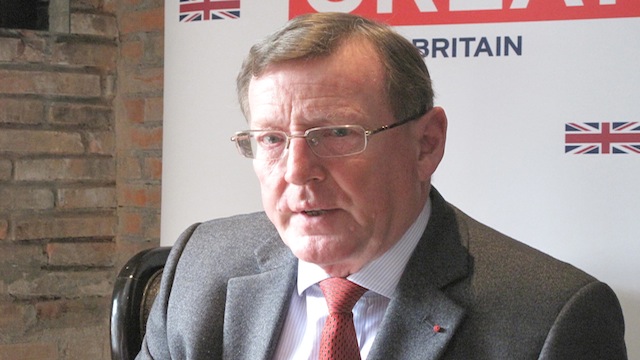SUMMARY
This is AI generated summarization, which may have errors. For context, always refer to the full article.
MANILA, Philippines – There will be difficulties in the implementation stage of the much-anticipated Bangsamoro peace deal, but they should not be regarded as upending the peace process.
This was the message of Nobel Peace Prize awardee Lord David Trimble on Friday, November 16, as he prepares to visit Mindanao over the weekend.
“Something to bear in mind is not to get too worried if something turns out to be more difficult or if the target you had in mind isn’t achieved. It’s not the end of the world. You’ve got to have a degree of flexibility when it comes to the implementation. That was our experience. It might help to just talk through that with others,” Lord Trimble said in a media conference.
Lord Trimble, one of the key players who helped resolve the 30-year conflict in Northern Ireland, is flying to Cotabato on Saturday, November 17.
He will meet with Moro Islamic Liberation Front (MILF) vice chairman for political affairs Ghadzali Jaafar and other members of the MILF central committee in the morning, and Autonomous Region in Muslim Mindanao Governor Mujiv Hataman in the evening.
But he will not be able to meet with MILF Chief Al-Hajji Murad Ebrahim and MILF Peace Panel Chairman Mohagher Iqbal because the two leaders are overseas. Murad is in Djibouti, Africa for the Organization of Islamic Cooperation meeting, according to Thomas Phipps, 2nd Secretary of the British Embassy in Manila, while Iqbal is in Kuala Lumpur for the 33rd round of formal exploratory talks with the government.
Lord Trimble will also be holding a public forum in Cotabato, where Christian and Muslim communities, as well as civil society groups, will have the chance to ask questions about his experiences with the peace process.
The 1998 Nobel Peace Prize awardee is in the country as part of the efforts of the British government to support the Mindanao peace process.
The United Kingdom is a member of an International Contact Group supporting the peace talks, along with Japan, Saudi and Turkey.
Learning from other peace processes
Lord Trimble stressed that he is not here to tell people what to do but only to share his experiences with parties involved, with the hope of helping them gain the confidence that the road to peace is possible.
“All I can do is give advice and talk about my experience that might be helpful to people and also would give people more confidence. I find myself when we were contemplating a talks process in Northern Ireland, we were invited by the South Africans. We had an interesting almost a series of seminars for all the key players from the South African talks came to us and described their experience,” he said.
“We listened carefully to it but we didn’t actually borrow any of the procedures they had but listening to the way them talking through their situation became a way of giving ourselves confidence about dealing with our own,” he added.
Lord Trimble said that the Mindanao visit will serve as learning process for someone like him, who also went through a similar experience.
“Also, I would like to ask them (MILF) where they are and what they think should happen next,” he said.
Since Lord Trimble’s arrival on Wednesday, November 14, he has met with Vice President Jejomar Binay, Office of the Presidential Adviser on the Peace Process Secretary Teresita Deles, Senators Teofisto Guingona, Panfilo Lacson and Vicente Sotto III, as well as members of the Lower House.
Decommissioning
Northern Ireland’s peace process went on a hiatus from 2002 to 2007 after the left-wing paramilitary organization Ireland Republican Army failed to fully surrender their arms.
But Lord Trimble told Rappler’s Talk Thursday that beyond the issue of handing over weapons, there must be real commitment from all parties to move away from violence.
“I think the party here, and I’m thinking particularly of the MILF, the question it should ask itself is: What do we need to do to generate confidence in other people that we are definitely changing and are definitely moving away from this?” Lord Trimble asked.
The issue of decommissioning is seen as one of the sticking points of the ongoing peace process. Iqbal had admitted that the provisions on policing was the most difficult part of the negotiations on the Framework Agreement.
Although operating in a different factual context, the Philippines faces similar issues as Northern Ireland.
Lord Trimble said peace processes in both countries involved these factors: a terrorist situation, religious elements (Protestants and Catholics in the case of Northern Ireland, and Muslims and Catholics in the case of Mindanao), territorial issues, cessation of hostilities, the recreation of a local regional administration, and continuing issues with paramilitary activities and the handling of weapons. – Rappler.com
Add a comment
How does this make you feel?

There are no comments yet. Add your comment to start the conversation.